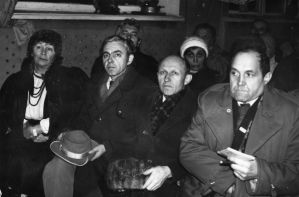IVAN HRYHOROVYCH PASHKOV (b. May 25, 1936, in Bekhteyevka, Korocha Raion, Belgorod Oblast, Russia – d. November 10, 2010, in Kharkiv)
Repressed journalist and poet. From a Ukrainian Cossack village in the Sloboda Ukraine region. In 1953, he enrolled in the journalism faculty of Kyiv State University named after T. Shevchenko. He was in the same class as Borys MARIAN, who, after the 20th Congress of the CPSU, drafted the “Minimum Program for the Democratic Restructuring of Society.” On January 7, 1957, at a meeting of the party and Komsomol activists where the author of the “Program” was being “dealt with,” Pashkov tried to defend his friend, but the rector, Academician I. H. Shvets, declared: “This rot must be decisively eliminated.”
After B. MARIAN’s imprisonment, Pashkov was expelled from the university and conscripted for active military service. He served in the Orenburg Oblast. In 1959, he was reinstated at Kyiv State University and graduated in 1961. That summer, along with his classmate Hryhoriy HAIOVY and his friend Mykola Maksymenko, he organized a tour of cities in Ukraine and Russia: Donbas – Belgorod region – Tambov region – Kursk region – Moscow, Tula, Bryansk, Chernihiv oblasts, and Kyiv. They kept travel journals and later corresponded.
One of Pashkov’s letters to HAIOVY, expressing doubts about the 22nd Congress of the CPSU, was intercepted by the KGB. Earlier, a dormitory neighbor had informed on H. HAIOVY’s diary entries, which also mentioned Pashkov. The KGB classified this as “anti-Soviet agitation and propaganda” (Article 62, Part 1 of the Criminal Code of the Ukrainian SSR), and their travels as an “intention to create an anti-Soviet organization” (Article 64 of the Criminal Code of the Ukrainian SSR). Pashkov had managed to work for a few months at a district newspaper in Korocha but was dismissed as unreliable.
He found a job as a school teacher of English in the village of Krasnopartyzansk, Sverdlovsk Raion, Luhansk Oblast, where he was arrested on March 21, 1962. His accomplice, M. Maksymenko, immediately sided with the investigation. Pashkov tried to explain his ideological differences with HAIOVY—from this, the investigation fabricated a “case.” He was also incriminated for his poem “Haidamaka” and the verse “Chvert veka” (A Quarter Century), dedicated to HAIOVY. The Luhansk Regional Court, in a closed session on June 30, 1962, sentenced H. HAIOVY to 5 years of imprisonment in strict-regime camps, Pashkov to 3 years, and M. Maksymenko to 2 years. Pashkov served his sentence in camp No. 11 in the settlement of Yavas (Mordovia). He belonged to a circle of imprisoned poets (including Valentyn Sokolov, Albert Novikov, and Yuriy LYTVYN).
He compiled a handwritten almanac, “Horyashchiye vetvi” (Burning Branches), which was secretly passed around. Avraam Shifrin, who was close to this circle, smuggled a collection of poems, including Pashkov’s, out of the zone and later published the anthology “Poeziya v kontslageryakh” (Poetry in the Concentration Camps) in Tel Aviv in 1976. After his release, Pashkov lived in Korocha, where he married. He worked in geological exploration in the Krasnoyarsk Krai (together with Yu. LYTVYN). Later, he moved to Kharkiv. He was a teacher, journalist, translator from English and German, and editor at the “Ukrpobutreklama” association. He established the “Kentavr” publishing house in Kharkiv, where, among other works, he published a collection of poems by his friend Yuriy LYTVYN, “Tragicheskaya galereya” (Tragic Gallery), at his own expense.
He helped create a museum in his native village of Barakhty in the Kyiv region. He donated a large collection of books by Kharkiv writers and poets to the arts lyceum where his granddaughter studied. He became a member of the Writers' Union of Russia in 1996 and a member of the National Writers' Union of Ukraine in 2000. Belgorod, Crimean, and Kharkiv composers wrote songs based on Pashkov’s poems. Literary compositions based on his verses were broadcast on the radio.
He authored five poetry books in Russian and one in Ukrainian. His collection “Yasnyy kolodets dushi” (The Clear Well of the Soul) (2008) was awarded the Boris Slutsky Literary Prize, and for the book “Istoriya Korochi” (The History of Korocha) (1998), he was awarded the title “Honorary Citizen of the City of Korocha.” He is buried in Kharkiv.
Bibliography:
I.
Pashkov, I. G. Khram na bolote: Stikhi [A Temple in the Swamp: Poems]. – Kharkiv: “Kharkivskyi zhurnalist,” 1992. – 96 p.
Pashkov, I. G. STIKhiYA: Stikhi [ELEMENTS/POEMS: Poems]. – Kharkiv: “Kharkivskyi zhurnalist,” 1993. – 90 p.
Pashkov, I. G. Korochanskiye sady: Stikhi [Korocha Gardens: Poems]. – Kharkiv: “Kharkivskyi zhurnalist,” 1994. – 88 p.
Pashkov, I. G. Otkroveniya ot Ivana: Stikhi [Revelations from Ivan: Poems]. – Kharkiv: “Kentavr,” 1995. – 72 p.
Lytvyn, Yu. T. Tragicheskaya galereya: Stikhi [Tragic Gallery: Poems] (Comp., [A Word about the Poet]: Ivan Pashkov). – Kharkiv: MCHI “Kentavr,” 1996 – 126 p.
Pashkov, I. G. Istoriya Korochi [The History of Korocha]. – 1998. Pashkov, Ivan. Dyke pole [The Wild Field]. – 1999.
Pashkov, I. G. Yasnyy kolodets dushi: Stikhi [The Clear Well of the Soul: Poems]. – 2008.
II.
Interview with Hryhoriy Haiovy, June 16, 1999.
Lists of victims: lists.memo.ru/d26/f34.htm
Ivan Pashkov [Obituary] // Literaturna Ukraina, 2002. – December 2.
Alexey Binkevich. Zagovori, chtob ya tebya uvidel… [Speak, so that I may see you…] // Gazeta “Vremya,” Kharkiv. 2009. – November 5.
Reviews: http://timeua.info/051109/10506.html
Photo by Ihor Hilbo, November 26, 1994. Commemoration of Yuriy Lytvyn in his native village of Barakhty in the Kyiv region. From right to left: Ivan Pashkov from Kharkiv, Myron and Mykhailo Buchatsky from Truskavets.
